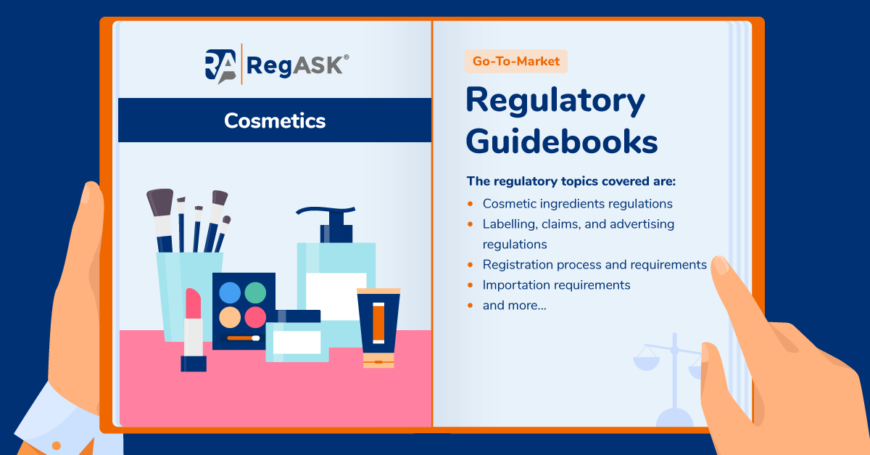The cosmetic industry is witnessing a post-pandemic renaissance, with sales on an upward trajectory, set to reach $580 billion by 2027, at a projected growth rate of 6% per year. Simultaneously, a wave of new regulations and requirements are flooding in.
These new regulations are in the areas of – (i) sustainable packaging (EU), waste-generation & microplastics (EU), (ii) safety & labelling (US), (iii) customized cosmetics (APAC) and (iv) fermented cosmetics. Other regulatory trends emerge around (v) greenwashing in the APAC region, DIY products, waterless beauty products to name a few, which have also come to fore. From the consumer’s perspective, trends in the industry are related to conscious consumerism through higher integration of ethics & sustainability, hyper-personalization through AI, rise in digital marketing, among others.
In this article, let’s talk about 5 major regulatory trends we have seen this year, which will have repercussions on the industry going forward.
1. Sustainability (packaging, waste generation, water footprint)
Perhaps the biggest regulatory trend (which has huge ramifications from the production perspective) is the increasing scrutiny on ensuring a deep level of integration of environmental sustainability in the cosmetics industry. This can be attributed to the rise of conscious consumerism, a general focus on environmental sustainability across industries & regulators alike and more research & innovation in decreasing the ecological footprint of cosmetic products.
- In the APAC & ASEAN region, sustainable packaging regulations are increasingly becoming a mandatory norm, with responsibilities extending across the lifecycle of cosmetic products, including recyclable packaging and sustainable disposal.
- Similarly, in the EU, the EU Packaging and Packaging Waste Directive was updated at the end of last year with new EPR (extended producer responsibility) rules, a drive to boost reuse & refill, a mandate to make all packaging recyclable and reducing packaging waste through improved labelling. The EU is also set to formalize its restriction on microplastics. This is in the backdrop of the EU Urban Wastewater Treatment Direction, which updated this year with new rules, mentioning the cosmetics industry as a major polluter due to its discharge of micropollutants in wastewater.
- Finally, the trend of ‘waterless beauty’ arising from the water crisis has also gained considerable traction, with cosmetics products with lower water footprint becoming popular. However regulations around this are still at early stages but are centered around the claims of being waterless, categorization of such products based on ingredients, safety and so on.
2. Safety and labelling
In the US, there was a significant update with respect to safety & labelling when the Modernization of the Cosmetics Regulations Act was signed into law by President Biden at the end of 2022. The law brings in the concept of a US “Responsible Person” (who must maintain records by the end of 2023 supporting that each cosmetic product has an “adequate substantiation of safety”).
Other regulatory updates with this law include-
- safety assessment of finished products,
- compulsory reporting of serious health & safety adverse incidents, and
- updated labelling requirements (where all cosmetics products in the country must be labelled with a US domestic address, telephone number and contact details of the US “Responsible Person”).
Safety regulations related to cosmetics are set to regularly evolve, with major updates globally, just like the US.
3. Customized cosmetics and DIY products
Led by the do-it-yourself (DIY) & customized cosmetics trends in the APAC region, there has been a significant push towards regulation of product refills and customized cosmetics, especially as demand for personalization of products has increased.
- While South Korea has a clear regulatory framework for customized cosmetics, Thailand, Indonesia, Philippines, and China have also been moving towards introducing regulations for customized cosmetics. These countries have been soliciting of industry opinions & introduction of draft regulations & programs, as the trend of customized cosmetics comes more and more into the fore.
- The DIY cosmetics trend which gained traction during and after the pandemic, has a more complicated regulatory process (especially in the EU/UK) due to unfixed multi-formula products. This entails higher costs and longer compliance process.
- However, regulations in this DIY domain will come in with separate considerations for DIY products/kits, with
- One set of regulations for those DIY products with only one possible recipe,
- Another set for those with different possible recipes and
- And yet another set for those DIY products where different ingredients are sold separately.
4. Is product registration or pre-market approval required for cosmetic products?
US FDA does not require product registration or pre-market approval or testing of cosmetic products placed on the US market, with the exception of color additives, which makes it easier for foreign cosmetic companies to enter the market. However, with the new upcoming regulation MoCRA, the notification of cosmetic products is required by December 29, 2023. From 2024, notification will be required within 120 days of marketing.
5. Is a responsible person required to sell cosmetics in the USA?
Under MoCRA, a “Responsible person” is defined as the manufacturer, packer, or distributor of a cosmetic product whose name appears on the label.
Its main responsibilities will be to ensure product listing, safety substantiation, cosmetovigilance, notification, and allergen labeling. In addition, the responsible person will have to carry out product recalls or withdrawals, if necessary.
Currently, manufacturers, packers, or distributors are not required to register their cosmetic establishments or file their product information with the FDA. However, as of December 29, 2023, the registration of establishments will be mandatory, whether in or outside the USA. The registration, which will have to be renewed every two years, does not apply to establishments that only perform labeling, packaging, or distribution of cosmetic products.
How RegASK Can Help You Sell Cosmetics in the US
Cosmetic companies entering the US market must be aware of the various regulations concerning their cosmetic products’ safety, labeling, and ingredients requirements to ensure compliance. Companies must take every step necessary to ensure their products meet all local standards and guidelines before being released to the market. Understanding local regulations can help companies avoid costly fines, product recalls, or potential litigation.
To assist cosmetic companies with successful market entry, RegASK has developed Cosmetics Go-To-Market Regulatory e-Guidebooks per market that provide a practical overview of the regulatory landscape and compliance requirements for cosmetic and personal care products per country.

The regulatory topics covered are:
- Cosmetic ingredients regulations
- Labelling, claims, and advertising regulations
- Registration process and requirements
- Importation requirements
and more…
The e-Guidebooks are constantly updated using RegASK’s regulatory intelligence platform RegAlerts. With RegAlerts, cosmetic companies can stay updated on regulatory changes worldwide, proactively adjust their product strategy and always stay ahead of the competition.
Are you looking to sell cosmetic and personal care products in the US? Speak to our experts to get all the support you need.
Have questions on cosmetic regulations?
Speak to our experts
Or you can also WhatsApp us by clicking this number +65 8128 2161
More cosmetics industry reading resources:
- EU Cosmetic Ingredients Ban: Implications for US Companies
- Selling Cosmetics on Alibaba and Amazon: What You Need to Know
- The Growing Importance of Regulations in the Cosmetics Industry, and Why It’s Important to Stay Up-To-Date
References:
[1] Statista – Consumer Market Insights – Beauty & Personal Care – United States
[2] U.S. FDA – Modernization of Cosmetics Regulation Act of 2022
[3] Personal Care Products Council Applauds Inclusion of Cosmetics Regulatory Reform in Consolidated Appropriations Act of 2023
[4] FDA Authority Over Cosmetics: How Cosmetics Are Not FDA-Approved, but Are FDA-Regulated
[5] U.S. FDA – Is It a Cosmetic, a Drug, or Both? (Or Is It Soap?)
[6] Cosmetics & Toiletries – [update] California’s ‘Toxic-free Cosmetics’ Act Signed into Law

